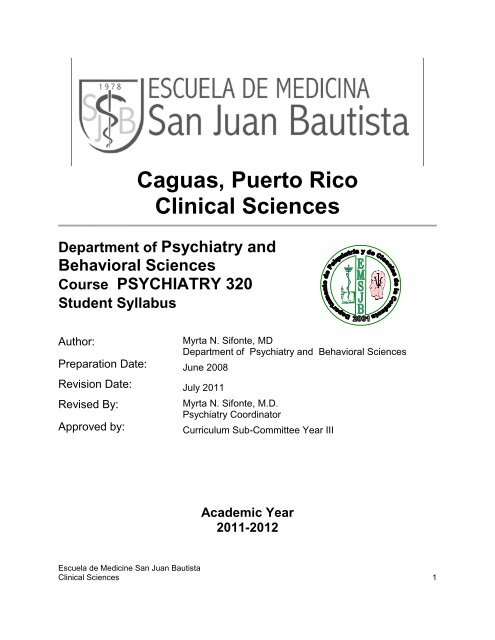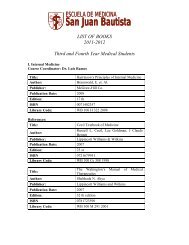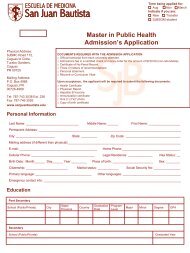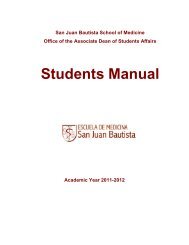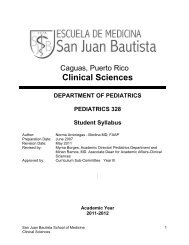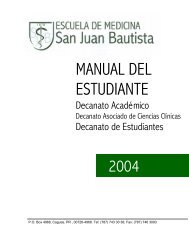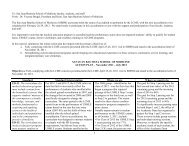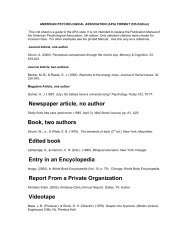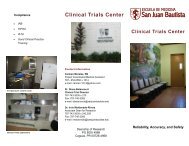San Juan Bautista School Of Medicine
San Juan Bautista School Of Medicine
San Juan Bautista School Of Medicine
Create successful ePaper yourself
Turn your PDF publications into a flip-book with our unique Google optimized e-Paper software.
Caguas, Puerto Rico<br />
Clinical Sciences<br />
Department of Psychiatry and<br />
Behavioral Sciences<br />
Course PSYCHIATRY 320<br />
Student Syllabus<br />
Author:<br />
Preparation Date: June 2008<br />
Revision Date: July 2011<br />
Revised By:<br />
Approved by:<br />
Myrta N. Sifonte, MD<br />
Department of Psychiatry and Behavioral Sciences<br />
Myrta N. Sifonte, M.D.<br />
Psychiatry Coordinator<br />
Curriculum Sub-Committee Year III<br />
Academic Year<br />
2011-2012<br />
Escuela de <strong>Medicine</strong> <strong>San</strong> <strong>Juan</strong> <strong>Bautista</strong><br />
Clinical Sciences 1
Department of Psychiatry and Behavioral Sciences<br />
PSYCHIATRY 320<br />
THIRD YEAR<br />
Credits: Six (6)<br />
Duration:<br />
6 weeks<br />
Classroom:<br />
Correctional Psychiatric Hospital<br />
First Hospital Panamericano<br />
<strong>San</strong> <strong>Juan</strong> de Capestrano Hospital<br />
Corporacion SANOS<br />
<strong>San</strong> <strong>Juan</strong> <strong>Bautista</strong> <strong>School</strong> of <strong>Medicine</strong><br />
Schedule:<br />
Monday to Friday 8:00a.m. to 4:30 p.m.<br />
Previous Requirements: Approved Basic Sciences Program<br />
COORDINATOR AND PROFESSORS INFORMATION<br />
Professor:<br />
Myrta N. Sifonte, M.D.<br />
Coordinator<br />
<strong>Of</strong>fice hours:<br />
By appointment<br />
Telephones:<br />
<strong>Of</strong>fice: 787-743-3038<br />
Cellular : 787- 460-2006<br />
Professor:<br />
Dr. Francisco <strong>San</strong>chez-Longo<br />
<strong>Of</strong>fice hours:<br />
By appointment<br />
Telephones:<br />
<strong>Of</strong>fice: 787-743-3038<br />
Cellular : 787-244-7244<br />
Escuela de Medicina <strong>San</strong> <strong>Juan</strong> <strong>Bautista</strong><br />
Clinical Sciences<br />
2
Professor:<br />
Carmen Martinez Cotto, MD<br />
Correctional Psychiatric Hospital<br />
<strong>Of</strong>fice hours:<br />
By appointment<br />
Telephones:<br />
<strong>Of</strong>fice: 787-758-8019 ext. 2117<br />
Professor:<br />
Sergio Matos, MD<br />
Correctional Psychiatric Hospital<br />
<strong>Of</strong>fice hours:<br />
By appointment<br />
Telephones:<br />
<strong>Of</strong>fice: 787-758-8019 ext. 2117<br />
Professor:<br />
Raul Rivera Mendez, MD<br />
Correctional Psychiatric Hospital<br />
<strong>Of</strong>fice hours:<br />
By appointment<br />
Telephones:<br />
<strong>Of</strong>fice: 787-758-8019 ext. 2117<br />
Professor:<br />
Lilliana Bicchi Consuegra, MD<br />
Correctional Psychiatric Hospital<br />
<strong>Of</strong>fice hours:<br />
By appointment<br />
Telephones:<br />
<strong>Of</strong>fice: 787-758-8019 ext. 2117<br />
Professor:<br />
Sylvia P. Johnson, M.D.<br />
Correctional Psychiatric Hospital<br />
<strong>Of</strong>fice hours:<br />
By appointment<br />
Telephones:<br />
<strong>Of</strong>fice: 787-758-8019 ext. 2117<br />
Professor:<br />
Lydia Fernandez Abalde, MD<br />
Correctional Psychiatric Hospital<br />
Escuela de Medicina <strong>San</strong> <strong>Juan</strong> <strong>Bautista</strong><br />
Clinical Sciences<br />
3
<strong>Of</strong>fice hours:<br />
By appointment<br />
Telephones:<br />
<strong>Of</strong>fice: 787-758-8019 ext. 2117<br />
Professor:<br />
Luis H. Negron, M.D.<br />
Correctional Psychiatric Hospital<br />
<strong>Of</strong>fice hours:<br />
By appointment<br />
Telephones:<br />
<strong>Of</strong>fice: 787-758-8019 ext. 2117<br />
Professor:<br />
Hilda Rivera Cartagena, M.D.<br />
Correctional Psychiatric Hospital<br />
<strong>Of</strong>fice hours:<br />
By appointment<br />
Telephones:<br />
<strong>Of</strong>fice: 787-758-8019 ext. 2117<br />
Professor:<br />
Carmen Tejada, M.D.<br />
Correctional Psychiatric Hospital<br />
<strong>Of</strong>fice hours:<br />
By appointment<br />
Telephones:<br />
<strong>Of</strong>fice: 787-758-8019 ext. 2117<br />
Professor:<br />
Celestino Flores Carmona, M.D.<br />
Correctional Psychiatric Hospital<br />
<strong>Of</strong>fice hours:<br />
By appointment<br />
Telephones:<br />
<strong>Of</strong>fice: 787-758-8019 ext. 2117<br />
Liaison SJBSOM-SANOS:<br />
Coordinator at First<br />
Hospital Panamericano:<br />
Dr. Myraida Rivera, Corporacion SANOS<br />
Ms. Aida <strong>San</strong>tiago<br />
Escuela de Medicina <strong>San</strong> <strong>Juan</strong> <strong>Bautista</strong><br />
Clinical Sciences<br />
4
RULES<br />
See Description in the Clerkship General Rules File<br />
PSYCHIATRY CLERKSHIP<br />
I. General Description<br />
The Psychiatry Clerkship is a six week clinical course that provides<br />
third year medical students with a solid foundation in the<br />
fundamentals of the evaluation, diagnosis, treatment, and<br />
appropriate referral of patients with mental health disorders.<br />
II.<br />
III.<br />
Prerequisites<br />
The first four semesters of the required EMSJB curriculum must be<br />
successfully completed prior to starting clerkship rotations<br />
including the Behavioral <strong>Medicine</strong> Course .<br />
Purpose<br />
The purpose of the Psychiatry Clerkship is to develop the student’s<br />
clinical skills in the diagnosis and treatment of patients who have<br />
mental disorders. Students will develop their skills in a variety of<br />
diagnostic and treatment procedures that are commonly involved<br />
in psychiatric care.<br />
IV.<br />
Course Objectives<br />
By the completion of the Clerkship, the student will be expected to<br />
master the following objectives:<br />
A. Skills:<br />
1. Based on the observations of clerkship faculty and/or the<br />
clerkship director, the student will demonstrate the ability<br />
to:<br />
a. Perform a complete psychiatric evaluation that will<br />
include identifying data, history of present illness, a<br />
psychosocial history, past psychiatric history, past<br />
medical history, current medical problems,<br />
alcohol/substance abuse history and mental status<br />
exam, summation and differential diagnosis<br />
b. Perform a problem focus exam<br />
c. Perform a mini mental status exam<br />
Escuela de Medicina <strong>San</strong> <strong>Juan</strong> <strong>Bautista</strong><br />
Clinical Sciences<br />
5
d. Do a risk assessment for suicide or potential to do<br />
harm to others and discuss an intervention plan<br />
e. Verbally present a case, the presentation will<br />
include present and past history, an assessment,<br />
differential diagnosis, a provisional diagnosis and<br />
treatment plan<br />
2. Based on the review of the clerkship director and<br />
clerkship faculty, the student will demonstrate the<br />
ability to:<br />
a. Write a case in a form satisfactory for a medical<br />
record<br />
b. Use technology to locate evidence based<br />
psychiatric information<br />
3. Based on the observations of clerkship faculty and/or<br />
the clerkship director, the student will demonstrate the<br />
ability to:<br />
a. Demonstrate respect, empathy, responsiveness,<br />
and concerns regardless of the patient’s problems<br />
or personal characteristics.<br />
b. Keep boundaries, recognize transference issues<br />
and set limits with patients.<br />
c. Verbally communicate in a manner understood by<br />
the patient and effective for gathering history.<br />
d. Be able to use basic strategies for interviewing<br />
disorganized, hostile/resistant, mistrustful,<br />
circumstantial/hyperverbal, hypoverbal, and<br />
potentially assaultive patients.<br />
4. Using a PDA, computer or other technology that<br />
accesses current evidence based medical information;<br />
the student will research topics of relevance to the<br />
clerkship. The information discovered will be of<br />
sufficient clinical utility to be included in evaluating and<br />
diagnosing a patient, formulating a treatment plan or<br />
composing reports/presentations on psychiatric topics.<br />
B. Knowledge:<br />
1. Based on the observations of clerkship faculty or the<br />
clerkship director during patient rounds, case<br />
presentations and small group discussions, the student<br />
Escuela de Medicina <strong>San</strong> <strong>Juan</strong> <strong>Bautista</strong><br />
Clinical Sciences<br />
6
will demonstrate the knowledge in the following core<br />
areas:<br />
a. Mental illnesses to include major depression,<br />
dysthymic disorder, bipolar disorder, adjustment<br />
disorders, generalized anxiety disorder, panic<br />
disorder, social phobia, obsessive compulsive<br />
disorder, substance and alcohol use, the three<br />
clusters of personality disorders with a particular<br />
focus on borderline personality disorder,<br />
schizophrenia/psychosis, dementia and delirium,<br />
somatoform disorders, factitious disorder,<br />
malingering and sleep disorders.<br />
b. Criteria A for the illnesses listed in the 4 th edition of<br />
Diagnostic and Statistics Manual of Mental<br />
Disorders for the conditions listed above.<br />
Demonstrate an understanding of the use of DSM<br />
IV<br />
c. Psychopharmacology to include the usage of<br />
anxiolytics, antidepressants (and ECT),<br />
antipsychotics, mood stabilizing agents,<br />
anticholinergics, acetylcholinesterase inhibitors, and<br />
namentine, psychostimulants, and beta blockers in<br />
treating the mentally ill.<br />
2. During discussions with faculty, the student will<br />
demonstrate and analysis of the role of the following in<br />
the comprehensive evaluation and management of a<br />
psychiatric patient:<br />
a. The comorbidity of mental, neurological and medical<br />
illnesses.<br />
b. The use of laboratory and various types of scans<br />
(CT, PET, MRI, etc.) to evaluate for mental illness<br />
or for the ongoing monitoring of medications.<br />
3. The student will construct and present to faculty an<br />
organized treatment plan addressing the findings of the<br />
evaluation. In addition to recommending medications<br />
using the principles of psychopharmacology, this<br />
presentation will demonstrate to the faculty:<br />
Escuela de Medicina <strong>San</strong> <strong>Juan</strong> <strong>Bautista</strong><br />
Clinical Sciences<br />
7
a. Recognition of the signs, symptoms, and risk factors<br />
for suicide, homicide and withdrawal from drugs and<br />
alcohol.<br />
b. The ability to asses the need to be hospitalized,<br />
versus treatment as an outpatient.<br />
c. The ability to utilize the basic concepts of various<br />
psychotherapies and propose ways to incorporate<br />
them into a treatment plan.<br />
4. For either incorporating into the treatment plan or<br />
using to assist in solidifying a difficult diagnosis, the<br />
student will demonstrate to the attending:<br />
a. A conceptual understanding of the indications for<br />
psychological testing.<br />
5. From the collection of information about the patient,<br />
the student will demonstrate to faculty:<br />
a. Recognition of the signs of abuse in all ages<br />
b. The differing presentations of mental illness over<br />
the life span.<br />
C. Attitudes and behaviors:<br />
1. In case presentations, patient write-ups and<br />
discussions with clerkship directors and preceptors,<br />
demonstrate the ability to remain objective and nonjudgmental<br />
toward a patient regardless of lifestyle and<br />
life choices. Empathy is a quality worth acquiring and<br />
diversity is rarely boring.<br />
2. No matter the setting (inpatient wards, ambulatory care<br />
centers, hallways, waiting rooms) the importance of<br />
confidentiality of psychiatric information will be<br />
demonstrated in discussing and interactions with<br />
attendings, colleagues, nurses, office staff, etc.<br />
3. During post evaluation discussions with attendings<br />
and/or intake personnel the student will be able to<br />
discuss the basic ethical issues in psychiatry such as<br />
involuntary treatment, the duty to warn about risks,<br />
reporting abuse (especially in children and elderly),<br />
and acceptable as well as unacceptable interactions<br />
with patients.<br />
Escuela de Medicina <strong>San</strong> <strong>Juan</strong> <strong>Bautista</strong><br />
Clinical Sciences<br />
8
4. Explain to faculty when and why to refer to a<br />
psychiatrist a patient being seen in a primary care<br />
setting for a mental condition.<br />
5. The student will demonstrate in case discussions with<br />
faculty and/or participation in multidisciplinary<br />
treatment team meetings, the role these next three<br />
items play in aftercare planning, compliance with<br />
treatment and maintaining a mentally ill person in the<br />
community:<br />
a. The biases in society, medicine in general, the law,<br />
and other arenas toward the mentally ill and how to<br />
be an advocate when necessary<br />
b. The barriers to treatment placed by society, the<br />
system, the mentally ill person himself, third party<br />
payers, etc.<br />
c. The need to work with community resources<br />
available for all age groups and know to which<br />
organization to contact for this type of assistance.<br />
(Social Services, Council on Aging, Children<br />
Services, etc.)<br />
V. Community <strong>Medicine</strong><br />
Since our <strong>School</strong> is defined as a “community-based institution”,<br />
Community Service is an institutional project that involves all<br />
constituencies with different actions and activities related to the<br />
community initiative. It is expected that through diverse strategies, the<br />
student will realize his\her original commitment to society in their roles<br />
as citizens and professionals<br />
COMMUNITY PROGRAM<br />
Is a Community <strong>Medicine</strong> Service-Learning activity developed in<br />
response to community-identified concerns in which third year medical<br />
students have an active participation. Students are involved in a direct<br />
intervention with patients (drug users, homeless, HIV, mental diseases),<br />
family, and community throughout outreach programs. There is a<br />
Escuela de Medicina <strong>San</strong> <strong>Juan</strong> <strong>Bautista</strong><br />
Clinical Sciences<br />
9
connection between their academic coursework (psychiatry rotation) and<br />
service combined with reflection.<br />
OBJECTIVES<br />
Community <strong>Medicine</strong> Emphasis<br />
o Apply the general concepts and practice of community<br />
medicine<br />
Medical Knowledge Emphasis<br />
o Apply basic sciences knowledge and Clinical <strong>Medicine</strong><br />
Professionalism Emphasis<br />
o Demonstrate professional attitudes, behaviors, compassion and<br />
humanism.<br />
o Recognize the world of practicing physicians throughout a<br />
variety of common community medical situation.<br />
o Understand the interactions between physicians, patients,<br />
families, community leaders, and community.<br />
Clinical Skills Emphasis<br />
o Communicate and interact effectively with the patients, families,<br />
community promoter, both verbally and in writing.<br />
o Obtain and record medical information<br />
Research and Information Literacy Emphasis<br />
o Increase the skills in critical review of literature<br />
EVALUATION<br />
The process of intervention with the patient and family in the community<br />
will be encouraged and evaluated through the following aspects:<br />
Escuela de Medicina <strong>San</strong> <strong>Juan</strong> <strong>Bautista</strong><br />
Clinical Sciences<br />
10
o Professionalism: Evaluation of Student Professionalism by Health<br />
Co-workers (see form CE-016) (20%)<br />
o Each student has to perform a clinical and psychiatric history to<br />
each patient seen and discuss the case with the psychologist or<br />
case manager (20%)<br />
o Evaluación de Profesionalismo del Estudiante por pacientes y<br />
familiares (CE- 014) (10%)<br />
o Student written report of community activity (see form CE-022)<br />
(20%)<br />
o Information Literacy (each group MUST analyze a scientific article<br />
of Additive disorders) (10%)<br />
o Attendance and punctuality: Student should attend every day<br />
schedule: 8:30 am to12:00n; except Tuesday 1:00 pm to 4:00 pm.<br />
Every day you MUST sign the attendance list. (20%). Failure to<br />
comply will decrease in 5% your grade<br />
VI.<br />
Curriculum<br />
A. The curriculum consists of:<br />
1. Performing clinical activities under direct supervision<br />
2. Observing clinical activities by faculty<br />
3. Reading assigned material<br />
4. Attending didactic presentations<br />
5. Performing other assigned duties that are designed to assist<br />
the student in learning to perform core psychiatric skills with<br />
increased proficiency<br />
B. The students will typically have the opportunity to:<br />
1. Observe and/ or conduct diagnostic evaluations with<br />
psychiatric patients<br />
2. Observe the presentation of patients who meet diagnostic<br />
criteria for many of the major DSM-IV-TR categories.<br />
3. Identify the essential and associated features of the relevant<br />
DSM-IV-TR diagnoses.<br />
4. Observe and/or participate in diagnostic decision making<br />
5. Observe and/or participate in the process of designing a<br />
treatment plan for psychiatric patients<br />
Escuela de Medicina <strong>San</strong> <strong>Juan</strong> <strong>Bautista</strong><br />
Clinical Sciences<br />
11
6. Observe and/or participate in a multi-disciplinary treatment<br />
approach for psychiatric patients.<br />
7. Observe and/or participate in the psychopharmacological<br />
treatment of patients within the major DSM-IV-TR diagnostic<br />
categories.<br />
8. Study the clinical use of psychotropic medications, including<br />
indications and contraindications, dosage scheduling, and<br />
modes of action.<br />
9. Study the clinical presentation and treatment of common<br />
pharmacological side effects, such as extrapyramidal<br />
symptoms and tardive dyskinesia.<br />
10. Observe and/or conduct patient education about<br />
psychotropic medications.<br />
11. Document and/or observe documentation of diagnostic and<br />
management activities utilizing the medical record system<br />
employed at the clerkship site.<br />
VII.<br />
Topics to be discussed<br />
Patient Type or Core<br />
Condition<br />
Mental Status<br />
Examination<br />
DSM IV TR<br />
Major Depressive<br />
Disorder<br />
Bipolar Disorder<br />
Methodology<br />
Lecture or Self<br />
Directed Study or<br />
OB or Case<br />
Learning Based<br />
Lecture or Self<br />
Directed Study or<br />
OB or Case<br />
Learning Based<br />
Lecture or Self<br />
Directed Study or<br />
OB or Case<br />
Learning Based<br />
Lecture or Self<br />
Directed Study or<br />
Person in<br />
Charge<br />
Attending<br />
Physicians<br />
Attending<br />
Physicians<br />
Attending<br />
Physicians<br />
Attending<br />
Physicians<br />
Escuela de Medicina <strong>San</strong> <strong>Juan</strong> <strong>Bautista</strong><br />
Clinical Sciences<br />
12
OB or Case<br />
Learning Based<br />
Dysthymia and<br />
Lecture or Self<br />
Cyclothymia<br />
Directed Study or<br />
OB or Case<br />
Learning Based<br />
Schizophrenia<br />
Lecture or Self<br />
Directed Study or<br />
OB or Case<br />
Learning Based<br />
Schizoaffective Disorder Lecture or Self<br />
Directed Study or<br />
OB or Case<br />
Learning Based<br />
Panic Disorder<br />
Lecture or Self<br />
Directed Study or<br />
OB or Case<br />
Learning Based<br />
Post Traumatic Stress Lecture or Self<br />
Disorder<br />
Directed Study or<br />
OB or Case<br />
Learning Based<br />
Obsessive Compulsive Lecture or Self<br />
Disorder<br />
Directed Study or<br />
OB or Case<br />
Learning Based<br />
Generalized Anxiety Lecture or Self<br />
Disorder<br />
Directed Study or<br />
OB or Case<br />
Learning Based<br />
Delirium, Dementia and Lecture or Self<br />
Amnestic Disorders Directed Study or<br />
OB or Case<br />
Learning Based<br />
Substance Use Disorders Lecture or Self<br />
Directed Study or<br />
OB or Case<br />
Learning Based<br />
Escuela de Medicina <strong>San</strong> <strong>Juan</strong> <strong>Bautista</strong><br />
Clinical Sciences<br />
Attending<br />
Physicians<br />
Attending<br />
Physicians<br />
Attending<br />
Physicians<br />
Attending<br />
Physicians<br />
Attending<br />
Physicians<br />
Attending<br />
Physicians<br />
Attending<br />
Physicians<br />
Attending<br />
Physicians<br />
Attending<br />
Physicians<br />
13
Alcohol Abuse,<br />
Dependence<br />
Personality Disorders<br />
Eating Disorders<br />
Somatization Disorders<br />
Malingering,<br />
Hypochondriasis,<br />
Factitious Disorder<br />
Psychotherapies<br />
Pharmacotherapy<br />
Children and Adolescent<br />
Psychiatric Disorders<br />
Lecture or Self<br />
Directed Study or<br />
OB or Case<br />
Learning Based<br />
Lecture or Self<br />
Directed Study or<br />
OB or Case<br />
Learning Based<br />
Lecture or Self<br />
Directed Study or<br />
OB or Case<br />
Learning Based<br />
Lecture or Self<br />
Directed Study or<br />
OB or Case<br />
Learning Based<br />
Lecture or Self<br />
Directed Study or<br />
OB or Case<br />
Learning Based<br />
Lecture or Self<br />
Directed Study or<br />
OB or Case<br />
Learning Based<br />
Lecture or Self<br />
Directed Study or<br />
OB or Case<br />
Learning Based<br />
Lecture or Self<br />
Directed Study or<br />
OB or Case<br />
Learning Based<br />
Attending<br />
Physicians<br />
Attending<br />
Physicians<br />
Attending<br />
Physicians<br />
Attending<br />
Physicians<br />
Attending<br />
Physicians<br />
Attending<br />
Physicians<br />
Attending<br />
Physicians<br />
Attending<br />
Physicians<br />
Escuela de Medicina <strong>San</strong> <strong>Juan</strong> <strong>Bautista</strong><br />
Clinical Sciences<br />
14
METHODOLOGY<br />
The third year clerkship will consist of direct clinical instruction through<br />
the following list but limited to:<br />
o Short topic discussions as scheduled by attending physicians<br />
o Conferences<br />
o Lectures<br />
o Case based discussions with coordinator<br />
o Standardized patients<br />
o Ward rounds<br />
o Bedside teaching<br />
o Case presentation<br />
o Computer assisted instruction<br />
o Library study, search of literature on specific topics<br />
o Student participation in community program<br />
HOMEWORK: All students must read and study the required reference<br />
for the assigned topic as they are expected to be prepared for the<br />
discussion of these topics.<br />
OSCE: All student s are required to take one formative and one<br />
summative examination in the psychiatry clerkship. During both<br />
encounters the student is required to hand in a written history including a<br />
mental status examination, diagnosis, and treatment plan. Attendance to<br />
these exams is compulsory. Students who score below 70% in the<br />
summative examination must take a make-up exam, after a remedial<br />
session. The summative examination score represents 15% of the final<br />
grade and the score for written report for the case represents 5% of the<br />
final grade.<br />
Subject Exam: All students must take and pass and end-of-clerkship<br />
exam (SHELF). Students, who obtain a failing score in the subject exam,<br />
must take it again at a specified later date. A student who fails to pass<br />
the Subject Exam on three occasions must repeat the clerkship. A<br />
remediation plan will be implemented for any student who fails to pass<br />
the Subject Exam on the first attempt. Participation in the remediation<br />
Escuela de Medicina <strong>San</strong> <strong>Juan</strong> <strong>Bautista</strong><br />
Clinical Sciences<br />
15
program is compulsory. The Subject Exam score represents 40% of the<br />
final grade.<br />
Patient type or<br />
core condition<br />
Psychiatry Clinical Encounter Grid<br />
Number required Level of<br />
to be seen (real Student<br />
or simulated) Responsibility<br />
Clinical<br />
Setting (O,I,<br />
SU)<br />
Major Depressive 3 OB, P O,I,SU<br />
Disorder<br />
Bipolar I 2 OB,P O,I,SU<br />
Bipolar II 1 OB,P O,I,SU<br />
Dysthymia 1 OB,P O,SU<br />
Other Affective<br />
1 OB,P O,SU<br />
Disorders<br />
Schizophrenia 3 OB,P O,I,SU<br />
Schizoaffective<br />
1 OB,P O,I,SU<br />
Disorder<br />
Psychosis NOS 1 OB,P O,I,SU<br />
Other Psychotic<br />
2 OB O,I,SU<br />
Disorders<br />
Panic Disorder 1 OB O,I,SU<br />
Post Traumatic<br />
Stress Disorder<br />
Obsessive<br />
Compulsive<br />
Disorder<br />
Generalized<br />
Anxiety<br />
Disorder<br />
1 OB O,I,SU<br />
1 OB O,I,SU<br />
1 OB O,I,SU<br />
Escuela de Medicina <strong>San</strong> <strong>Juan</strong> <strong>Bautista</strong><br />
Clinical Sciences<br />
16
Patient type or<br />
core condition<br />
Number required<br />
to be seen (real<br />
or simulated)<br />
Level of<br />
Student<br />
Responsibility<br />
Clinical<br />
Setting (O,I,<br />
SU)<br />
Other Anxiety<br />
1 OB O,I,SU<br />
Disorders<br />
Alcohol<br />
2 OB,P O,I<br />
Dependence<br />
Alcohol<br />
1 OB O,I<br />
Withdrawal<br />
Cannabis<br />
1 OB,P O<br />
Dependence<br />
Cannabis<br />
1 OB O<br />
Withdrawal<br />
Opioid<br />
2 OB,P O,I<br />
Dependence<br />
Opioid<br />
1 OB O,I<br />
Withdrawal<br />
Cocaine<br />
2 OB,P O,I<br />
Dependence<br />
Cocaine<br />
1 OB O,I<br />
Withdrawal<br />
Benzodiazepine<br />
1 OB O,I,SU<br />
Dependence<br />
Benzodiazepine<br />
1 OB O,I,SU<br />
Withdrawal<br />
Anorexia 1 OB O,SU<br />
OB= Observation (CR only)<br />
P= Participation (Hx/PE and CR)<br />
O= Outpatient<br />
I=Inpatient<br />
SU: Stabilization Unit<br />
VIII. Student Responsibilities<br />
Please refer to Clerkship General Rules File<br />
IX.<br />
Course Evaluations and Grading Procedures<br />
Please refer to Clerkship General Rules Guide<br />
Escuela de Medicina <strong>San</strong> <strong>Juan</strong> <strong>Bautista</strong><br />
Clinical Sciences<br />
17
X. Work Schedule<br />
8:00am<br />
Hour<br />
Arrival<br />
Daily Work Schedule<br />
Activity<br />
9:00- 10:00am Morning Report<br />
8:30-12:00 m Assigned patient interview and evaluations (inpatient) or<br />
conference<br />
12:00-1:00pm<br />
1:00-2:00pm<br />
2:00-3:00pm<br />
3:00-4:30pm<br />
Lunch<br />
Clinical case presentation and discussion with the staff<br />
psychiatrist or conference<br />
Psychiatry consulation evaluation or conference<br />
Patient Interviews<br />
Escuela de Medicina <strong>San</strong> <strong>Juan</strong> <strong>Bautista</strong><br />
Clinical Sciences<br />
18
XI.<br />
Learning Resources<br />
A. Textbook:<br />
Title:<br />
On Call Psychiatry<br />
Author:<br />
Carol A. Bernstein<br />
Publisher:<br />
ISBN:<br />
141602574X<br />
Publication Date: 2006<br />
Edition:<br />
Third<br />
Library Code:<br />
Approximate Cost: $54.95<br />
Considerations:<br />
Escuela de Medicina <strong>San</strong> <strong>Juan</strong> <strong>Bautista</strong><br />
Clinical Sciences<br />
Elsevier Health Sciences<br />
This book is the ideal text for practical acute psychiatric intervention. The<br />
book emphasizes the most common psychiatric management of acute<br />
psychiatric patient. Exceptionally effective in teaching you how to handle<br />
the complex interplay of psychological and biological factors in human<br />
development in a very simple structuring action.<br />
B. References<br />
1. Kaplan, Harold and Benjamin Sadock. Kaplan and Sadock's<br />
Comprehensive Textbook of Psychiatry. 9 th Edition. Williams and<br />
Wilkins, 2009. ISBN: 0781734347 Library Code: WM 100 K17 2004 2<br />
Vol. Set: Vols. 1 & 2.<br />
2. Kaplan, Harold and Benjamin Sadock. Synopsis of Psychiatry,<br />
Behavior Science-Clinical Psychiatry. 10 th Edition. Maryland:<br />
Williams and Wilkins, 2007. ISBN: 0-683-30330-9 Library Code: WM<br />
100 Fr VIII 1998. American Psychiatric Association.<br />
3. Diagnostic and Statistical Manual of Mental Disorder (DSM IV-TR)<br />
4 th Edition. Washington, D.C., American Psychiatric Press, 2000.<br />
ISBN: 0-89042-024-6. Library Code: WM 15 D536 1994<br />
4. American Psychiatric Association. A Psychiatric Glossary. 8 th Edition;<br />
Washington, American Psychiatric Press, 1994. ISBN: 0-88048-508-6.<br />
Library Code: WM 13AM VII 1994<br />
19
C. Supplementary Readings:<br />
1. High-Yield-Behavioral Science, 3 rd Edition. Lippincott Williams &<br />
Wilkins, 2009<br />
2. Behavioral Sciences Pre-Test, 9 th Edition. McGraw-Hill, 2002<br />
3. Psychiatry Pre-Test, 12 th Edition. McGraw-Hill, 2009<br />
4. First Aid for the Psychiatry Clerkship, 3 rd Edition. McGraw-Hill,<br />
2011<br />
D. Journal Materials<br />
E. Videos:<br />
1. The American Journal of Psychiatry, American Psychiatric<br />
Association, American Psychiatric Association Press Washington,<br />
D.C., 2011<br />
2. Journal of the American Academy of Child and Adolescent<br />
Psychiatry, The American Academy of Child and Adolescent<br />
Psychiatry, Washington, D.C., 2011<br />
1. The Hidden Nature of Man<br />
2. Controlling Aggression and Hostility in Psychiatric Patient, The<br />
Psychosis Heralding a New Era, Milestone <strong>Medicine</strong>,1997, Janssen<br />
Pharmaceutical<br />
3. The Clinical Implications of Neuroreceptor Occupancy in the<br />
Management of Psychosis, Psychlink, Interactive Medical Network,<br />
2000, Janssen Pharmaceutical<br />
4. Treatment Options in the Psychosis, The Psychosis Heralding a<br />
New Era, Milestone <strong>Medicine</strong>, 1997, Janssen Pharmaceutical<br />
5. Using Antipsychotic Agents in Bipolar Disorder, The Psychosis<br />
heralding a new Era, Milestone <strong>Medicine</strong>, 1996, Janssen<br />
Pharmaceutical<br />
6. A Guide to Prevention, Recognition and Treatment in the Era of<br />
Atypical Antipsychotics, Brown University <strong>School</strong> of <strong>Medicine</strong>, 2000<br />
7. I am Still Here (The Truth of Schizophrenia),Janssen<br />
Pharmaceutical, 1997, Jansen Pharmaceutical<br />
8. Understanding Obsessive Compulsive Disorder, Solvay<br />
Pharmaceutical, 1997<br />
Escuela de Medicina <strong>San</strong> <strong>Juan</strong> <strong>Bautista</strong><br />
Clinical Sciences<br />
20
9. Minimental State Examination, Pfizer, 1997<br />
10. Understanding Social Anxiety Disorder, SmithKline Beecham, 1999<br />
11. Preserving Cognitive Function in Schizophrenia, The Psychosis<br />
Heralding Area, Milestone <strong>Medicine</strong>, 1998, Janssen<br />
Pharmaceutical<br />
12. The Pathophysiology of Schizophrenia and Implications for Drug<br />
Therapy, Milestone <strong>Medicine</strong>,1996, Janssen Pharmaceutical<br />
13. Identification and Management of the First Episode of<br />
Schizophrenia, The Psychoses Heralding New Era, Milestone<br />
<strong>Medicine</strong>, 1996 ,Janssen Pharmaceutical<br />
14. Antypsyhotic Agents and Adverse Events, The Psychoses<br />
Heralding a New Era, Milestone <strong>Medicine</strong>, 1996, Janssen<br />
Pharmaceutical<br />
F. Internet Resources:<br />
URL<br />
American Psychiatric Association<br />
www.psych.org<br />
American Academy of Child & Adolescent<br />
Psychiatry<br />
www.aacap.org<br />
American Medical Association<br />
www.ama_assn.org<br />
National Institute of Mental Health<br />
www.nimh.nih.gov<br />
www.findlaw.com<br />
Content<br />
Find news, research, clinical<br />
resources, education, guidelines and<br />
public information<br />
Home page of AACAP. Information<br />
on developmental, behavioral,<br />
emotional and mental disorders<br />
Professional and advocacy<br />
organization for the medical<br />
profession.<br />
Find news and events, research,<br />
clinical trials and information for<br />
practitioners.<br />
Text of Supreme Court Decisions<br />
Escuela de Medicina <strong>San</strong> <strong>Juan</strong> <strong>Bautista</strong><br />
Clinical Sciences<br />
21


